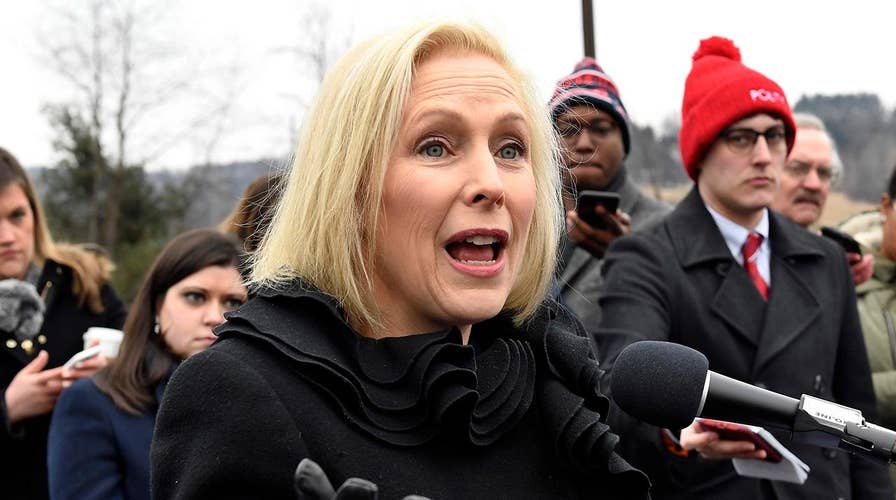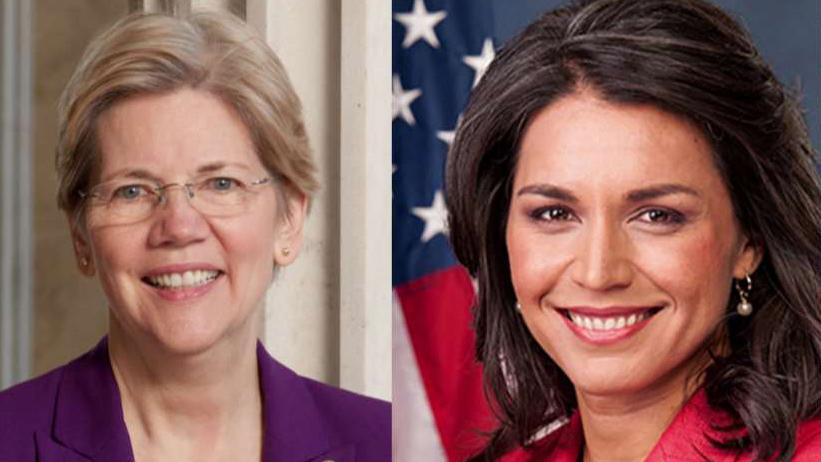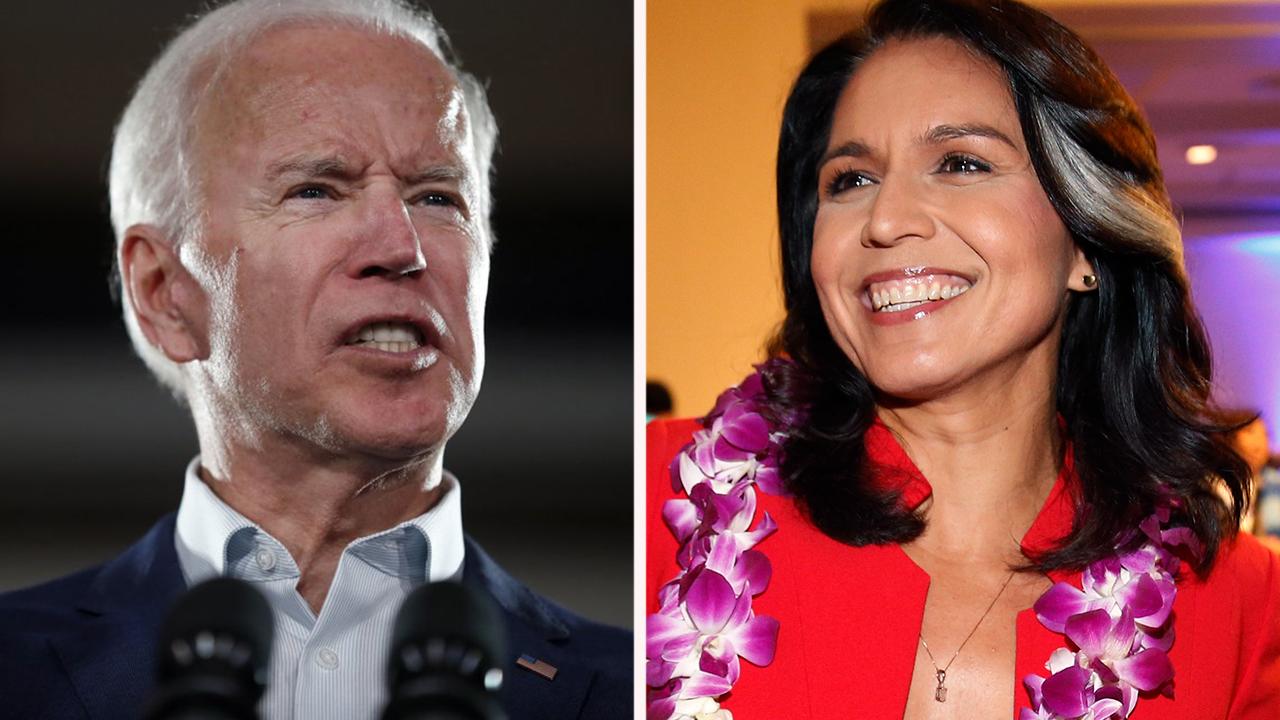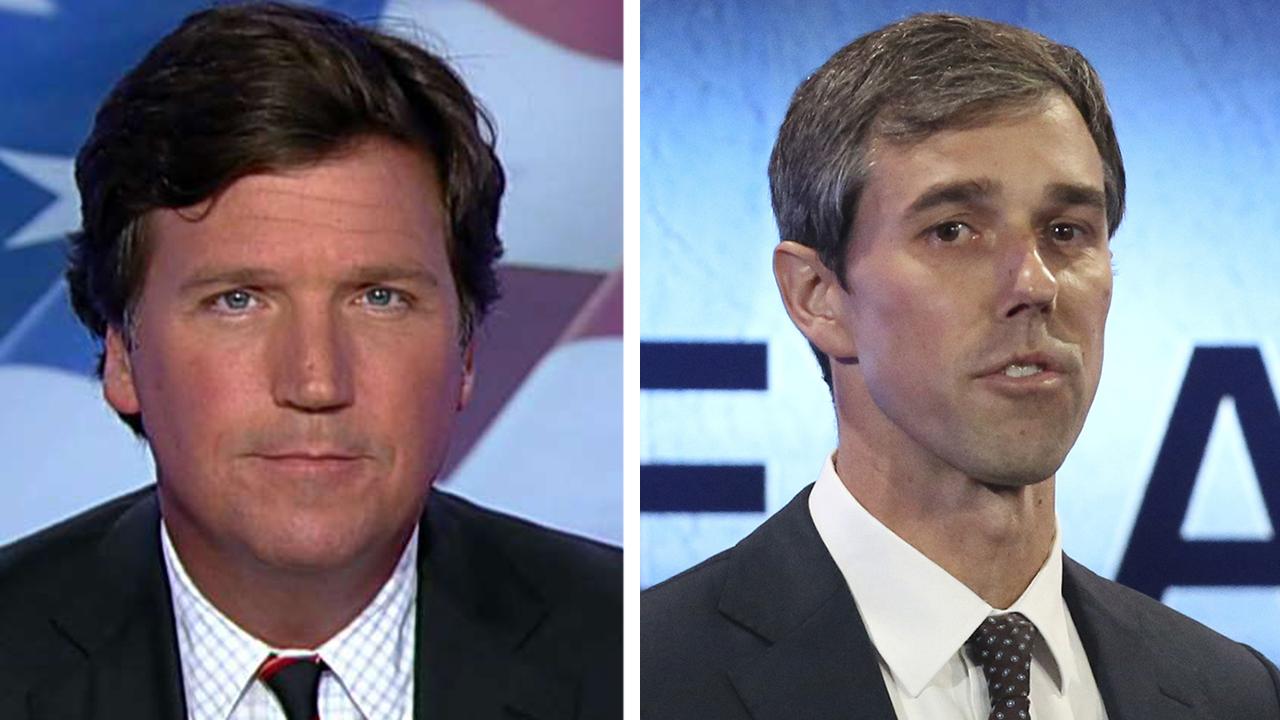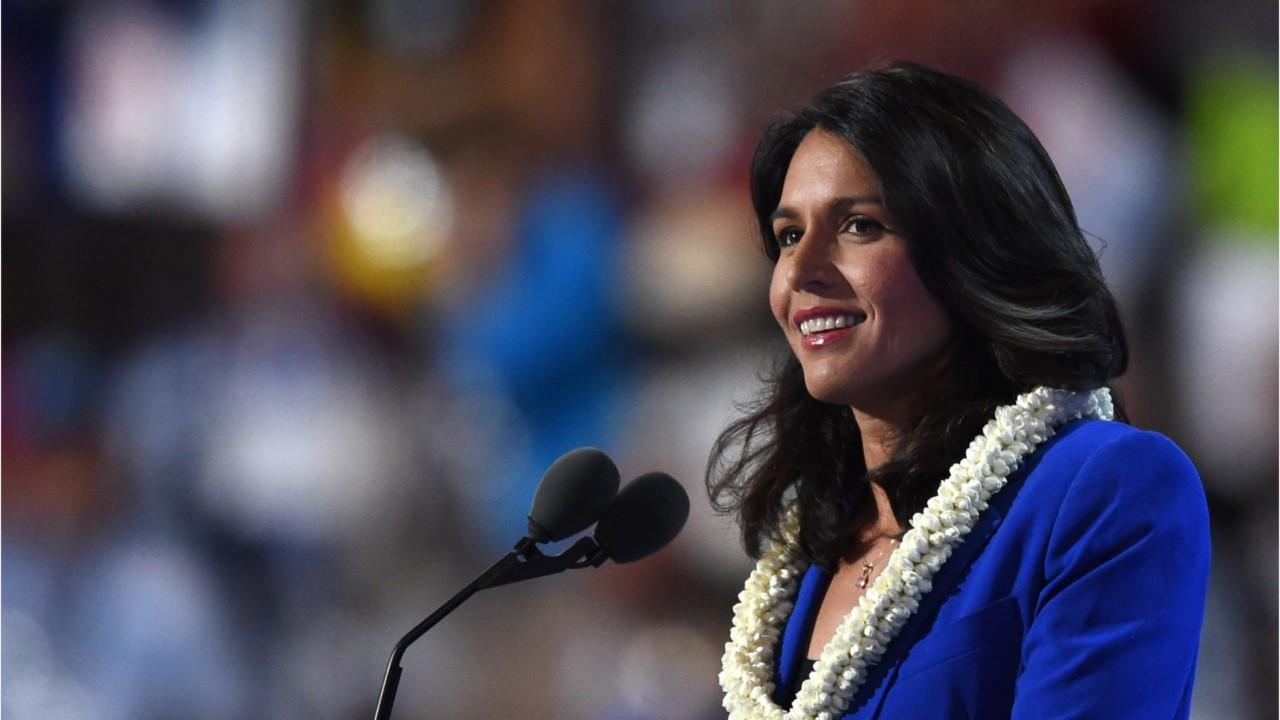Democrats are breaking the norm in their 2020 presidential bid announcements, even on late night TV
Former National Republican Senatorial Committee general counsel Alex Vogel and former DNC communications director Mo Elleithee weigh in on the growing field of 2020 Democrat presidential hopefuls.
The 2020 presidential race is just beginning, and already several declared or possible Democratic contenders once seen as moderates have shifted markedly to the left, in apparent appeals to the party's powerful progressive wing that have at the same time exposed them to charges of political opportunism.
New York Sen. Kirsten Gillibrand, former Texas Senate candidate Beto O'Rourke, and Hawaii Rep. Tulsi Gabbard are among the prominent Democrats whose fiery rhetoric little resembles their more moderate days off the national stage.
“While Democrats race to the radical left, they are running further away from mainstream Americans," Republican National Committee spokesman Steve Guest told Fox News.
Gillibrand, who announced she was planning a presidential run on Tuesday night, boasted in 2009 about receiving a 100 percent "A" rating from the National Rifle Association (NRA) and said she kept two guns under her bed. She was also a member of the conservative Democratic Blue Dog coalition when she represented New York's rural 20th congressional district in the House.
Gillibrand first began recasting her politics upon her appointment by then-Gov. David Paterson to fill the Senate seat vacated by Hillary Clinton in 2009. Liberal groups had savaged Gillibrand at the time not only for her pro-Second Amendment views, but also her strong opposition to illegal immigration -- which included a plan to make English the official language of the U.S. and to empower local law enforcement officials to enforce federal immigration laws.
WHO IS KIRSTEN GILLIBRAND? 5 THINGS TO KNOW ABOUT THE NEW DEMOCRATIC HOPEFUL
Now one of the most outspoken advocates for eliminating Immigration and Customs Enforcement (ICE), Gillibrand admitted in 2009 that she would have to change her views because she now represented "the whole state," rather than a traditionally conservative enclave.
The NRA quickly downgraded her perfect gun-rights rating to an "F" during her first year in the Senate, as she embraced gun-control proposals and described her epiphany on the dangers of unregulated firearms. In 2012, she wrote an op-ed in the New York Daily News asserting that the attempted assassination of Rep. Gabby Giffords in early 2011 at the hands of a mentally ill gunman had convinced her of the need for "reasonable limits" on the Second Amendment.
In 2018, Gillibrand told CBS News' "60 Minutes" that she was "embarrassed" by her previous views on gun rights and "ashamed" of her stance on illegal immigration.
"I came from a district that was 98 percent white," Gillibrand told the network. "We have immigrants, but not a lot of immigrants. And I hadn't really spent the time to hear those kind of stories about what's it like to worry that your dad could be taken away at any moment."
GROWING NUMBER OF 2020 DEMS SUPPORTING 'GREEN NEW DEAL'
She added: “After I got appointed, I went down to Brooklyn to meet with families who had suffered from gun violence in their communities. And you immediately experience the feeling that I couldn’t have been more wrong. You know, I only had the lens of upstate New York.” (Prior to becoming a congresswoman, Gillibrand had lived in New York City for approximately a decade.)
Gillibrand has also reversed her position on driver's licenses for illegal immigrants, suggesting she supports the idea after previously opposing it years ago.
Some of the senator's overtures to the progressive left have been less well received. Late last year, Gillibrand tweeted that the "future" is both "female" and "intersectional," prompting a rebuke from Florida Republican Sen. Marco Rubio, who responded that the future is "American" and "an identity based not on gender, race, ethnicity or religion."
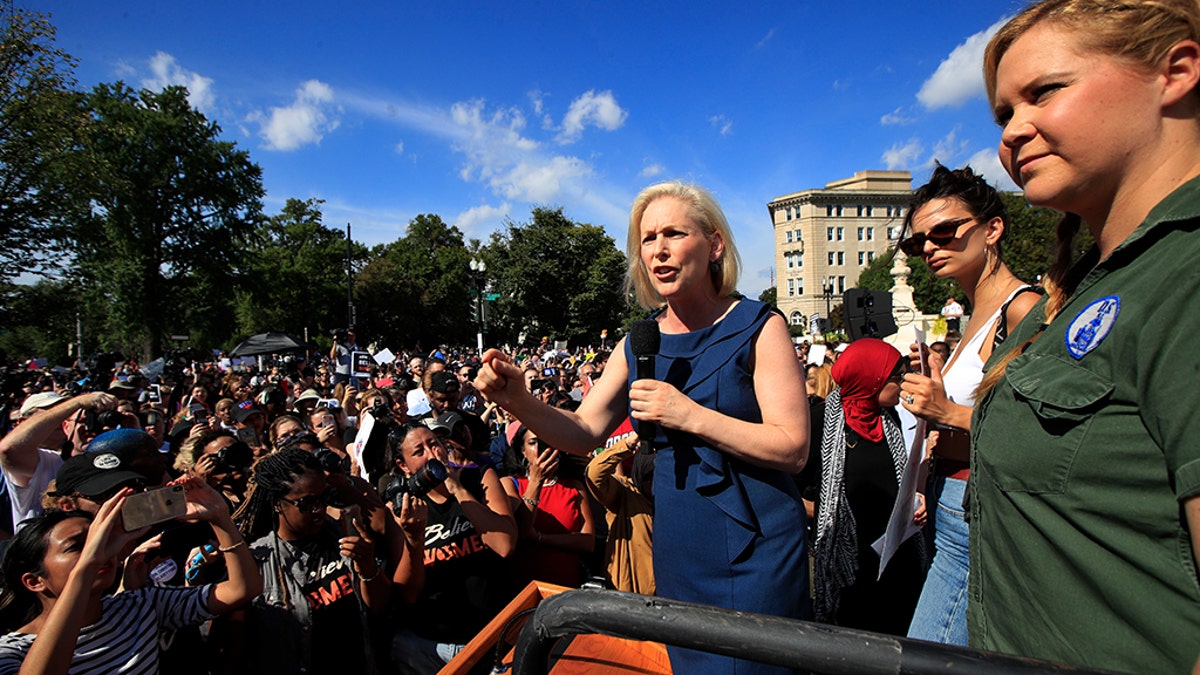
Sen. Kirsten Gillibrand, D-N.Y., with actress and comedian Amy Schumer, right, speaks at a rally against Supreme Court nominee Brett Kavanaugh at the Supreme Court in Washington, Thursday, Oct. 4, 2018. (AP Photo/Manuel Balce Ceneta) (AP Photo/Manuel Balce Ceneta)
Added Donald Trump Jr. :“Good to know. My girls will be excited about this. When is it appropriate to let my boys (9, 7 and 6 years old) that there's no future for them? Not sure this is a winning platform but you be you.”
Gillibrand has also been described by GQ Magazine as "the face of #metoo," after she led to charge to secure former Minnesota Democratic Sen. Al Franken's resignation in 2017 amid claims of sexual misconduct. But her role in Franken's ouster rankled some progressives who felt that Franken was a victim of a rush to judgment.
In 2018, liberal billionaire megadonor George Soros charged that Gillibrand turned on Franken to "improve her chances" in the 2020 presidential race. "I may add that there’s only one whom I would not like to see succeed, and that’s Gillibrand of New York," Soros told The Washington Post.
"I don't think it disqualifies her," former New York lieutenant governor Richard Ravitch told Business Insider. "I just don't like or respect what she did."
"While Democrats race to the radical left, they are running further away from mainstream Americans."
For her part, Gillibrand fired back at Soros, saying that if he has a problem with her handling of the Franken situation, "that's on him."
More recently, Gillibrand has faced claims of misleading voters during her 2018 Senate run. Less than three months ago, Gillibrand promised when asked directly about her possible White House ambitions that "I will serve my six-year term" in the Senate, rather than run for the presidency. Gillibrand overwhelmingly won re-election in November.
New York GOP spokeswoman Jessica Proud, in a statement this week, characterized Gillibrand's shifts as disqualifying and cynical.
“It was only three months ago during the campaign that Kirsten Gillibrand point-blank lied to New Yorkers that she would fulfill her term if re-elected," Proud said. "In her lackluster career as an elected official, she has demonstrated a disturbing disregard for the truth and principled positions in the name of self-serving personal advancement. If she treats her current constituents with such disrespect, we shudder to think what she’d do to the nation.”
Like Gillibrand, the 46-year-old O'Rourke previously served in the House of Representatives, where he built a reputation as a moderate Democrat willing to reach bipartisan compromise -- even though, unlike Gillibrand, he represented a heavily Democratic district. O'Rourke has not formally announced that he is running for president, but is widely considered a potential contender.
GOP ADOPTING TAKE-NO-PRISONERS APPROACH TO EVEN LONGSHOT 2020 DEMS
O'Rourke was one of a handful of Democrats to support the Anti-Border Corruption Reauthorization Act in 2017, which permitted the Customs and Border Patrol (CBP) commissioner to waive the polygraph requirement for certain applicants seeking to join the agency.
The then-congressman said the legislation was needed to “help speed up the hiring process and provide the CBP commissioner additional authorities to recruit and hire quality CBP officers and border patrol agents."
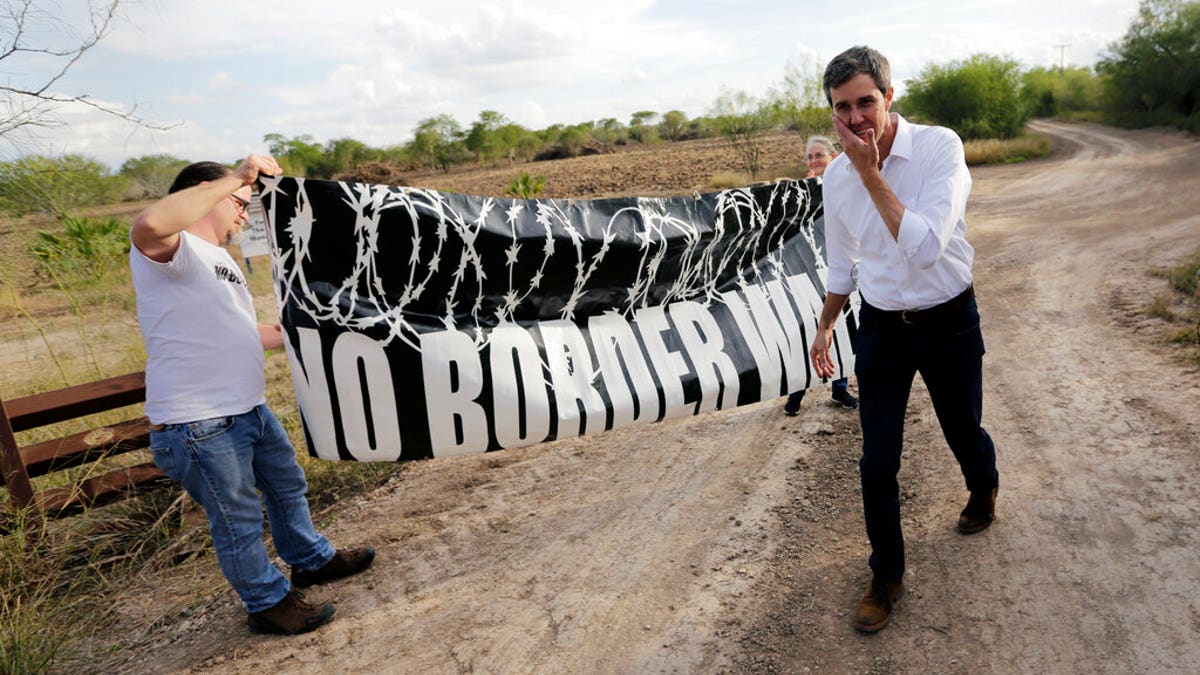
FILE - In this Saturday, Jan. 6, 2018, file photo, Texas Democratic Congressman Beto O'Rourke, right, passes a "No Border Wall" sign during a visit to the National Butterfly Center in Mission, Texas, a possible location for a border wall. President Donald Trump is not giving up on his demands for $5.7 billion to build a wall along the U.S.-Mexico border, saying a physical barrier is central to any strategy for addressing the security and humanitarian crisis at the southern border. Democrats argue that funding the construction of a steel barrier along roughly 234 miles will not solve the problems. (AP Photo/Eric Gay, File)
But then-Illinois Democratic Rep. Luis Gutierrez, at the time, remarked that "Anyone who votes for this bill is voting to support and implement Donald Trump’s views on immigration, his desire to militarize our southern border, and his fantasy of a mass deportation force.”
In 2015, O'Rourke was among a small number of House Democrats to oppose an oil export ban, and the next year, he rejected an amendment that would have barred spending on research for offshore drilling.
The votes were typical for O'Rourke, whose outreach to Republicans was cited during his Senate run by numerous newspaper editorial boards, including the El Paso Times. An analysis by FiveThirtyEight found that in his final year in Congress, O'Rourke sided with the Trump administration 30 percent of the time, and ProPublica data showed he was among the top 20 percent of Democrats most willing to buck his own party.
O'Rourke opted not to sponsor Democratic legislation aimed at providing free college and Medicare-for-all, and did not become a member of the Congressional Progressive Caucus -- choosing instead to join the moderate New Democrat Coalition.
In December, O'Rourke even demurred when asked if he is a progressive, saying only, "I don't know" and insisting that he was not "big on labels."
Nevertheless, both during the course of his Senate run and afterwards, O'Rourke sharpened his progressive bona fides, calling explicitly for single-payer universal health care, legalizing marijuana, and impeaching President Trump.
In an interview The Washington Post this week, O'Rourke claimed that border walls like the one proposed by Trump "will ensure death," and he even suggested the principles in the Constitution may be outdated and useless in the modern age.
But The Post's article revealed that O'Rourke, like Gillibrand, faces skepticism about the sincerity of his apparent change of heart. The paper's report included an apparent shot by at O'Rourke from Gutierrez, who told The Post he was “very pleasantly surprised” that O'Rourke -- who represented a mostly Hispanic district during his three terms in the House of Representatives -- was "suddenly interested" in immigration reform efforts last year.
ANDY PUZDER: WHY BERNIE SANDERS' MINIMUM WAGE PROPOSAL IS IRRELEVANT
The interview additionally included several comments from O'Rourke calling for debate on various issues, from the White House's Syria pullout to immigration reform, rather than offering specific policy proposals.
But perhaps the most dramatic shift towards the progressive wing among prospective 2020 Democratic hopefuls has come from Tulsi Gabbard, the 37-year-old Hawaii congresswoman who has served since 2013.
Gabbard spoke at the Democratic National Convention in 2012, and her initial congressional bid was endorsed by then-President Barack Obama. She also served as one of four vice chairs on the Democratic National Committee (DNC) -- but has since become a self-described enemy of the party's establishment.

FILE - In this Nov. 6, 2018, file photo, Rep. Tulsi Gabbard, D-Hawaii, greets supporters in Honolulu. Gabbard has announced she’s running for president in 2020. The 37-year-old Gabbard said in a CNN interview slated to air Saturday night that she will be formally announcing her candidacy within the week. (AP Photo/Marco Garcia, File)
In 2011, Gabbard wrote a lengthy explainer on her campaign website that delved into her changes of heart on a variety of issues. Gabbard announced in the blog post that she was now "committed to preserving a woman's right to choose," even though "at one time, I was anti-choice."
"I also once supported a state constitutional amendment defining marriage as between a man and a woman," she added.
All that changed, Gabbard claimed, when she served two tours of duty in the Middle East, and saw how governments there "maintain excessive control of people's personal lives."
The about-face struck some commentators as unpersuasive. Zack Beauchamp, a senior correspondent for the left-leaning Vox.com, wrote on Wednesday that "a skeptic could cast this as mere political convenience: a person who had spent much of her adult life in politics getting a sense of which way the wind was blowing in the party."
In 2016, Gabbard bucked the Obama administration by aligning herself with Syrian dictator Bashar al-Assad, and by criticizing Obama's refusal to use the term "radical Islam."
Most dramatically, Gabbard endorsed Vermont independent Sen. Bernie Sanders' presidential candidacy. She resigned as DNC vice chair in the process, cementing her abandonment of the party's more centrist establishment in favor of Sanders' rejection of the status quo.
But the main problem for Gabbard, observers said in the hours after she announced her presidential bid last week, was that she had espoused hardline beliefs on issues like homosexuality in the past.
Gabbard was a visible force against same-sex marriage, and in 2004 spearheaded a fight in the state against a same-sex union measure. “To try to act as if there is a difference between ‘civil unions’ and same-sex marriage is dishonest, cowardly and extremely disrespectful to the people of Hawaii,” she said at the time. “As Democrats, we should be representing the views of the people, not a small number of homosexual extremists.”
Gabbard also gave a lengthy speech at the Hawaii State House against a proposed resolution that addressed the bullying of gay students in public schools. Gabbard argued the resolution would cast homosexuality as normal, and that it would attract “homosexual-advocacy organizations into our schools to promote their agenda to our vulnerable youth.”
Those comments, gay-rights activists said this week, were politically unforgivable.
“We’ve seen [people] who may held a particular view and evolved to a place of acceptance, but rarely have we seen someone who was so actively and vehemently and viscerally against LGBTQ equality and acceptance,” said Zeke Stokes, the vice president of programs at GLAAD, one of the most prominent LGBTQ advocacy groups, in an interview with Fox News. “[Gabbard] was someone who worked so actively against our community when the stakes were so high.”
Gabbard now says she's evolved, reportedly explaining: “Much work remains to ensure equality and civil rights protections for LGBTQ+ Americans and if elected president, I will continue to fight for equal rights for all.”
Fox News' Elizabeth Llorente contributed to this report.
